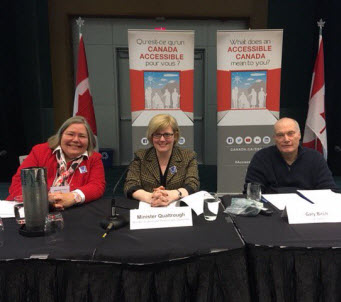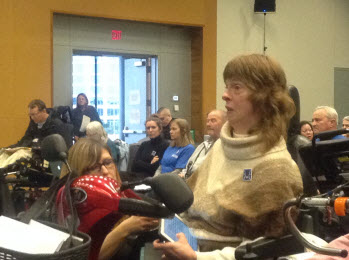An Accessible Canada Means Canadians with Communication Disabilities Are Heard, Recognized and Valued

(Photo credit: @AccessibleGC)
Minister for Sports and Persons with Disabilities Carla Qualtrough and her team are holding public consultations around the country and gathering thoughts, perspectives and suggestions for the forthcoming Canadians with Disabilities Act, for an #AccessibleCanada for all.
Last Saturday, a public consultation session was held in Vancouver, British Columbia. I had the opportunity to share the assumptions, misperceptions and barriers that I face living with a speech disability. Click to listen to my words.

(The transcript is below. Please ignore the extra commas; they help to make a synthesized voice sound a teeny more expressive.)
Good afternoon! I am Glenda Watson Hyatt, a self advocate, an author, and a motivational speaker.
I have both a physical, and a speech disability. Of the two, living with a communication disability, is the most frustrating and isolating. Simple tasks like inquiring about a government service, calling for a taxi cab, or even ordering a chai tea latte, can be an exasperating ordeal.
Like other Canadians living with speech and language disabilities, I am often assumed to be cognitively impaired, or deaf, in which case, gesturing ensues, an impromptu game of charades. Friends with communication disabilities, have been assumed drunk, and the police or paramedics needlessly called.
Our methods of communicating are often denied. For example, on one trip to the emergency room, my husband, who also uses a wheelchair for mobility, was told to wait in the waiting room, because there was not enough space for both of our chairs. We attempted to explain that, I needed him for assistance with communication, yet he was still told to leave. Imagine a person who is deaf being denied a sign language interpreter. The situation is similar, yet my need for assistance with communication, is typically not recognized. My communication access requirement is not protected.
Other medical doctors have refused to speak directly with me. They do not seem to understand that, even though they do not understand my speech, I can hear them and understand them.
When medical professionals do not understand, do not respect, that hearing and cognition, are not necessarily impacted, by communication disabilities, then there is little chance, the general public will understand, and respect this, without an ongoing, widespread, information and awareness campaign.
This lack of understanding, of my actual disability, makes complex endeavours, like finding meaning employment, extremely difficult, if not impossible.
I am struggling to get by on social assistance, not because I lack education, skills, talents, motivation, or technology to accommodate my disability. I am struggling on social assistance, because I could not find an employer, who saw beyond the assumptions, and misperceptions, of my disability.
Even within the disability community, people with communication disabilities, are routinely overlooked and excluded. The non partisan, Barrier Free Canada, a major driving force for the Canadians with Disabilities Act, states in its principles that, “The Canadians with Disabilities Act should apply to all persons with disabilities whether they have a physical, mental, sensory, learning and, or intellectual disability, or mental health condition.” Canadians with communication disabilities, are not mentioned.
What would it take to fix these barriers?
Begin by following, Barrier Free British Columbia’s lead, which includes in its principles, “The Act will apply to all persons with disabilities whether their disability is considered physical, sensory, cognitive, communication, or mental health related.”
Canadians with speech and language disabilities, need to be recognized, to be heard, to be included. We may not be the most vocal group, but we still need to be at the table, to be involved, and to be contributing. We need to have, our communication access requirements, acknowledged, and protected.
Thank you!
To keep up with my adventures, musings and insights, sign up to receive my future posts via email.
If you enjoyed this post, consider buying me a chai tea latte. Thanks kindly.
 Subscribe via RSS
Subscribe via RSS



